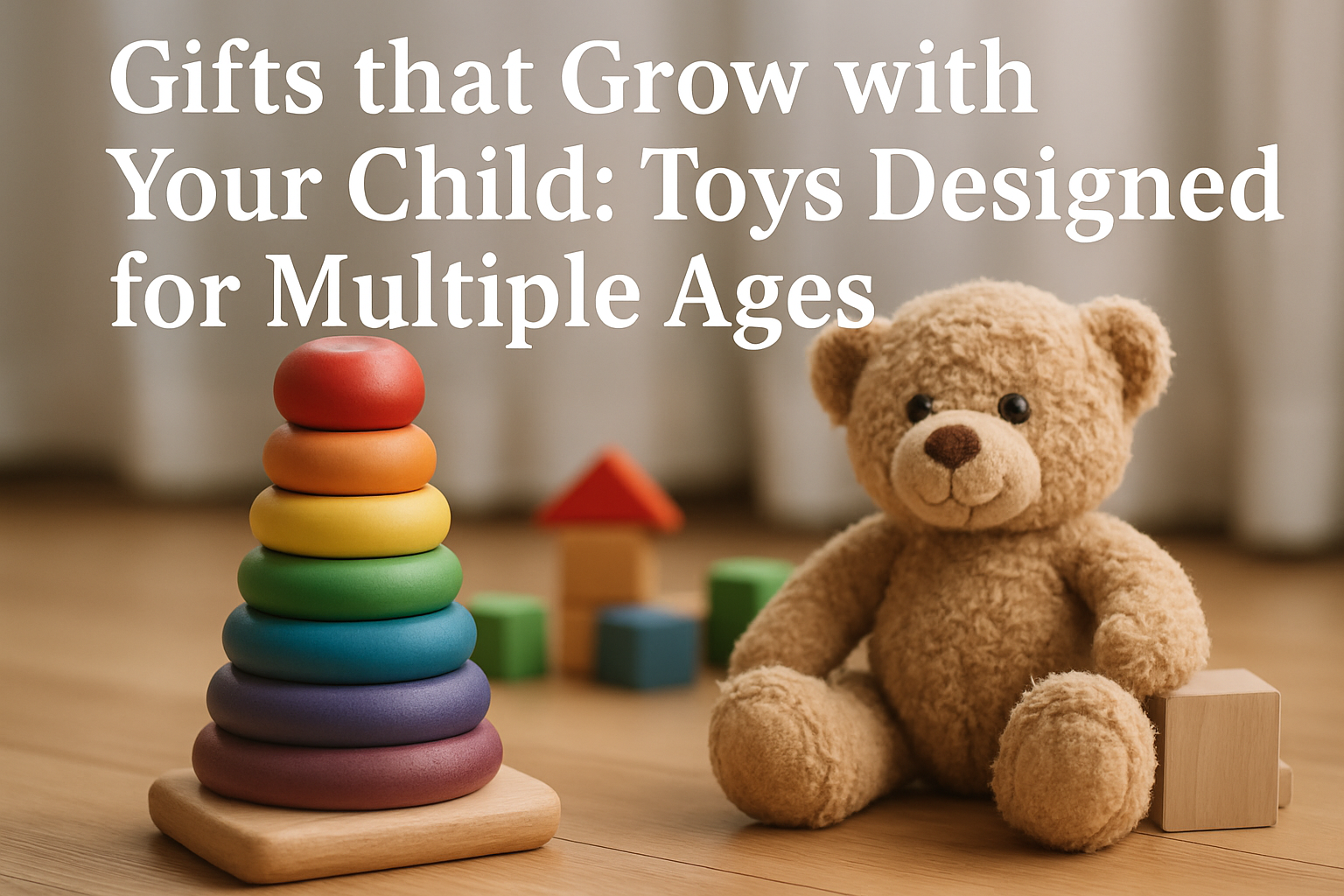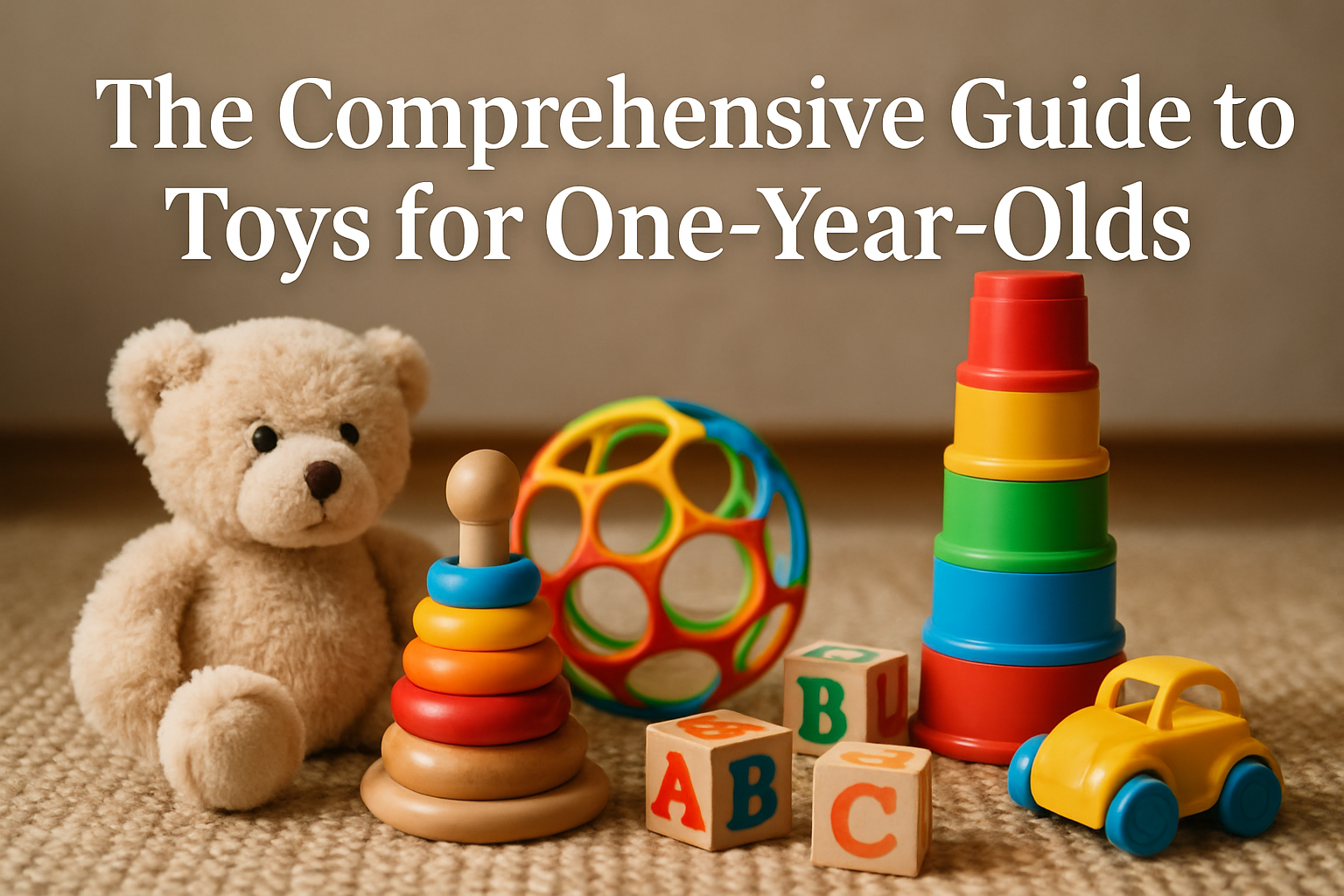The Comprehensive Guide to Toys for One-Year-Olds
Purpose of the DiscussionEducational toys play a significant role in a child'...

Add description, images, menus and links to your mega menu
A column with no settings can be used as a spacer
Link to your collections, sales and even external links
Add up to five columns
Add description, images, menus and links to your mega menu
A column with no settings can be used as a spacer
Link to your collections, sales and even external links
Add up to five columns

Educational toys play a significant role in a child's growth and development. They serve not just as entertainment but also as tools that enhance various skills. From improving fine motor skills to fostering problem-solving abilities, these toys lay the groundwork for lifelong learning. The right educational toy can spark curiosity and engage children, making the learning experience enjoyable. As children play, they absorb information and ideas that contribute to their overall development.
Toys designed to adapt to various stages of childhood are incredibly valuable. These toys can evolve with a child's changing abilities and interests. For instance, a simple stacking toy can offer initial tactile stimulation for infants and later challenge toddlers with more complex sorting activities. As children grow, the same toy can facilitate imaginative play and storytelling, showcasing its versatility. This ability to transition serves a dual purpose: it not only keeps children engaged but also allows parents to invest in toys that will last through multiple phases of growth.
One of the standout features of these toys is their long-lasting play value. As children master new skills, they often revisit familiar toys to explore them in new ways. This continued engagement helps solidify their understanding of concepts and nurtures creativity. Educational toys that grow with children encourage exploration and experimentation, laying a solid foundation for critical thinking. By selecting these versatile toys, parents can ensure that their children have access to playthings that support their developmental journey from infancy through childhood and beyond.
Understanding the different developmental stages of children is essential in selecting the right toys for them. From toddlers to early school years, each age group demonstrates unique developmental milestones that can significantly influence their playtime. Recognizing these milestones allows parents and caregivers to choose toys that not only entertain but also foster growth in various areas such as cognitive, social, and motor skills.
For toddlers aged 1-3 years, the focus is primarily on exploration and sensory experiences. Toys that are brightly colored, textured, and safe to chew on are perfect for this stage. Building blocks, stacking toys, and simple puzzles can help enhance fine motor skills and problem-solving abilities. Additionally, art supplies like crayons and safe paint encourage creativity while allowing toddlers to express themselves. Having toys that stimulate curiosity and creativity is key in this developmental stage.
As children transition into preschool years (ages 3-5), they begin to engage in more complex play and social interactions. During this period, toys that promote imaginative play, such as costumes, playsets, and dolls, can enormously benefit their social and emotional development. These toys help children learn to share, cooperate, and communicate with their peers. Moreover, educational toys that introduce basic numbers, letters, and shapes can lay the groundwork for early academic skills. By providing toys that match their developmental stage, caregivers can significantly boost children’s readiness for school and enhance their overall growth.
In early school years (ages 6-8), children start to exhibit more advanced skills and interests. At this stage, toys that encourage collaborative play, such as board games and team-building activities, become increasingly relevant. They foster teamwork and decision-making skills, which are critical as children navigate their school environment and friendships. Furthermore, science kits, craft sets, and LEGO-like building toys can fuel their curiosity and problem-solving capabilities. By incorporating age-appropriate toys into their play, caregivers can help children develop confidence and skills that prepare them for the challenges ahead.
Selecting age-appropriate toys is necessary for nurturing children's growth and development at every stage. By understanding developmental milestones, caregivers can choose toys that support children in developing vital skills, ensuring their play is both enjoyable and beneficial.
Toys that adapt to multiple age groups exemplify versatility in child development. These toys can be utilized at various life stages, accommodating the evolving skills and interests of children as they grow. For instance, a building block set may start as a tool for simple stacking and eventually transform into a means for a child to explore more complex architectural designs. This adaptability not only encourages children to engage with the same toys for longer periods but also reduces the need for frequent replacements as they progress through different developmental phases.
This long-term use translates directly into cost-effectiveness. Parents face numerous financial responsibilities when raising children, and investing in versatile toys can yield significant savings over time. Instead of purchasing new toys at each developmental stage, parents can select a single multi-age toy that remains relevant for several years. Moreover, budget-conscious families can benefit from the longevity of these products, allowing them to allocate funds to other essential areas of their child's upbringing.
Another noteworthy aspect of versatile toys is their environmental impact. As the world faces increasing challenges related to sustainability, choosing toys that last helps mitigate waste. By investing in items that grow with children, families contribute to reduced production demands, thus minimizing the resources needed for new toy manufacturing. Reducing consumption aligns with a broader commitment to environmental stewardship, which becomes increasingly vital in today’s context of climate consciousness.
Toys that evolve with a child's capabilities provide valuable learning opportunities that are integral to cognitive and social development. Engaging in play with versatile toys fosters the acquisition of essential life skills, such as problem-solving, cooperation, and emotional intelligence. By using these toys in diverse ways, children learn to think critically and adaptively, facilitating not only play but also active learning experiences that resonate into later life.
Diverse activities involving interactive toys can enhance learning significantly. For example, puzzles challenge children to engage with shapes and patterns, fostering their spatial awareness and logical reasoning. Similarly, role-playing sets inspire creativity and imagination, allowing children to simulate real-world situations and explore different perspectives. These activities stimulate curiosity and encourage open-ended exploration, which is vital for holistic development. When children feel empowered to learn through play, their enthusiasm for discovery often flourishes.
Imagination plays a pivotal role in skill development through play. Toys that encourage imaginative scenarios allow children to navigate various roles and situations, enriching their understanding of the world around them. By fostering creativity, these toys not only contribute to emotional growth but also inspire critical thinking and innovation. Children learn to express themselves and engage with complex concepts, promoting a lifelong love of learning. As they immerse themselves in imaginative play, they are not just having fun; they are also building foundational skills that will benefit them throughout their lives.
Choosing the right toys for children is essential for their development, which is why a carefully curated selection of toys awaits at Little Learner Toys. This collection has been thoughtfully designed to cater to every age and stage of a child's growth. From infants just starting to explore the world around them to toddlers learning to make choices and develop skills, these toys play a vital role in growth. Each toy is selected not just for fun, but also for its ability to support key developmental milestones.
Little Learner Toys focuses on unique offerings that specifically address various developmental needs. Whether it is through sensory play, motor skills enhancement, or imaginative play, each category is crafted to enhance a child's learning experience. For instance, colorful building blocks help develop spatial awareness and fine motor skills, while interactive toys engage children in learning numbers or letters. This diversity encourages parents to choose toys that align with their children’s growth pathways. An understanding of a child's interest and developmental stage can guide parents in making informed selections, ensuring a beneficial and enjoyable play experience.
Selecting the right toys extends beyond mere choices; it's about exploring what fosters a child's holistic development. Parents are encouraged to consider a range of toy types, from puzzles that enhance problem-solving skills to art supplies that fuel creativity. Each type of toy offers distinctive benefits that contribute to a well-rounded development approach. When parents prioritize toys that reflect these aspects, they create an environment conducive to learning through play. The convenience of purchasing directly from Little Learner Toys simplifies this process, allowing parents to find the perfect items swiftly and efficiently without unnecessary distractions or overwhelming choices.
When making important purchase decisions, it’s essential to provide parents with tips on selection based on age and interest. Engaging with toys in various forms encourages children to explore, learn, and grow in multifaceted ways. Emphasizing quality over quantity, parents are guided to prioritize toys that offer lasting engagement rather than those that may quickly lose their appeal. By informing parents about the significance of selecting age-appropriate toys, Little Learner Toys aims to support sustainable development that nurtures curiosity and fosters a lifelong love for learning in children.
Choosing the right toys for children is vital for aiding their development. Toys that grow along with children can enhance their various skills at different ages. As children develop, their interests and capabilities change, meaning that the toys they play with should evolve accordingly. Selecting toys that adapt to different stages of growth not only keeps children engaged but also supports their cognitive and physical development. For instance, toys that promote problem-solving abilities and creativity can be particularly beneficial as children's skills mature.
Moreover, investing in developmental and educational toys is an important step in promoting lifelong learning. These toys are designed to foster critical thinking, improve motor skills, and encourage social interaction. Research indicates that such toys can provide immense benefits by teaching children how to communicate, share, and collaborate with their peers. The right educational toys can make learning fun, ensuring that children not only enjoy their playtime but also gain valuable skills that they can carry into their future. Encouraging parents to prioritize these types of toys can help them create opportunities for rich learning experiences at home.
Finally, it is encouraged to explore unique offerings designed for every stage of growth. Many toys are specifically crafted to cater to various developmental milestones. By understanding the needs of children at different ages, parents can make informed decisions that will equip their children for success. Whether it’s toys that stimulate sensory exploration for infants or complex puzzles for school-aged children, the market offers a plethora of options. Engaging with these thoughtfully designed toys can foster an environment where children can thrive, learn, and grow.

Purpose of the DiscussionEducational toys play a significant role in a child'...

Purpose of the DiscussionEducational toys play a significant role in a child'...
Sign up for updates, sneak peeks and a coupon for 10% OFF your first order!